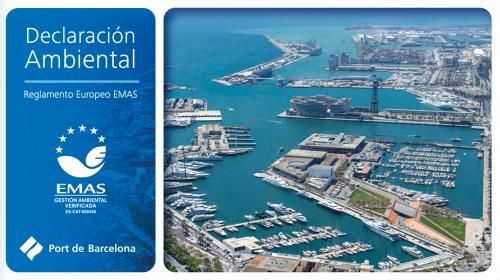Environmental Statement EMAS
This section presents the Environmental Statement of the Port Authority of the Port of Barcelona. It is a memorandum document that publicly and reliably reports on the current status and the evolution of the indicators of the European EMAS Regulation in terms of eco-management and auditing.

The Port of Barcelona is one of the first port organizations worldwide to have adopted and maintained its Management System based on the EMAS Regulation (Eco-Management and Audit Scheme). This is a voluntary system of communication and excellence that complements the requirements of the ISO 14001 standard.
This commitment allows it to go beyond mere regulatory compliance, driving continuous improvement and full transparency. The Port of Barcelona thus strengthens its reputation as a reliable and responsible partner. In a world that demands genuine commitment to sustainability, the Port of Barcelona not only follows the path—it leads it, and is transparent in the validated information it presents.
Water consumption and responsible energy
In a context of climate emergency and periods of drought, responsible water management is a priority for the Port of Barcelona. The Barcelona Port Authority (APB) has implemented rigorous measures to optimize consumption, ensuring efficient and sustainable administration of this vital resource.
As part of the fight against climate change, energy management at the Port of Barcelona is a strategic priority. The APB is working to reduce its carbon footprint and that of the Port Community, with a firm commitment to renewable energy and electrification as key drivers of change.
Les obres portuàries

Waste generation
The Port of Barcelona assumes full responsibility for the comprehensive management of waste generated both within its own facilities and those of third parties. The Barcelona Port Authority oversees the collection and handling of waste from its buildings, facilities, common areas, and street cleaning. It also manages waste from the bars and restaurants located within the port, as well as waste from occasional cleaning operations.
The Port of Barcelona has implemented selective waste collection across its facilities, with dedicated containers for paper, glass, and packaging. This system also extends to waste management for concessionaire companies and vessels. The Barcelona Port Authority holds licenses for the reception of ship-generated waste, both liquid and solid, in compliance with the International Convention for the Prevention of Pollution from Ships (MARPOL Convention).
Altres aspectes de rellevància
Ecology and Biodiversity
The Port of Barcelona acknowledges its responsibility in protecting biodiversity, especially due to its proximity to the Integral Reserve of the Llobregat Delta. The Barcelona Port Authority has implemented measures to minimize the impact of its activities and construction works on ecosystems, with the aim of protecting bird populations and other species.
Chapter of the Environmental Statement
Management and Planning
The Port of Barcelona operates under a robust environmental management and planning system. Since 2001, the Barcelona Port Authority has maintained ISO 14001 certification, an international standard that demonstrates its commitment to environmental protection. Furthermore, since 2014, the port has been registered in the European Union’s EMAS system, which is voluntary and even more demanding. This commitment is further reinforced by adherence to the sector-specific PERS (Port Environmental Review System) standard.
Chapter of the Environmental Statement
Stakeholders
The Port of Barcelona understands that its commitment to sustainability is a shared responsibility that goes beyond its internal operations. For this reason, it integrates the expectations and demands of all stakeholders into its daily management. This approach is implemented through a Sectoral Sustainability Plan—an internationally unique initiative aimed at promoting and systematizing sustainable practices among all organizations that are part of the Port Community.
Chapter of the Environmental Statement
Environmental Compliance
The Barcelona Port Authority complies with current environmental legislation and is subject to international conventions for the protection of the sea, air, and soil. This proactive approach goes beyond minimum obligations, using control tools such as ordinances and technical specifications to ensure that all activities within the port are carried out sustainably.
Chapter of the Environmental Statement

